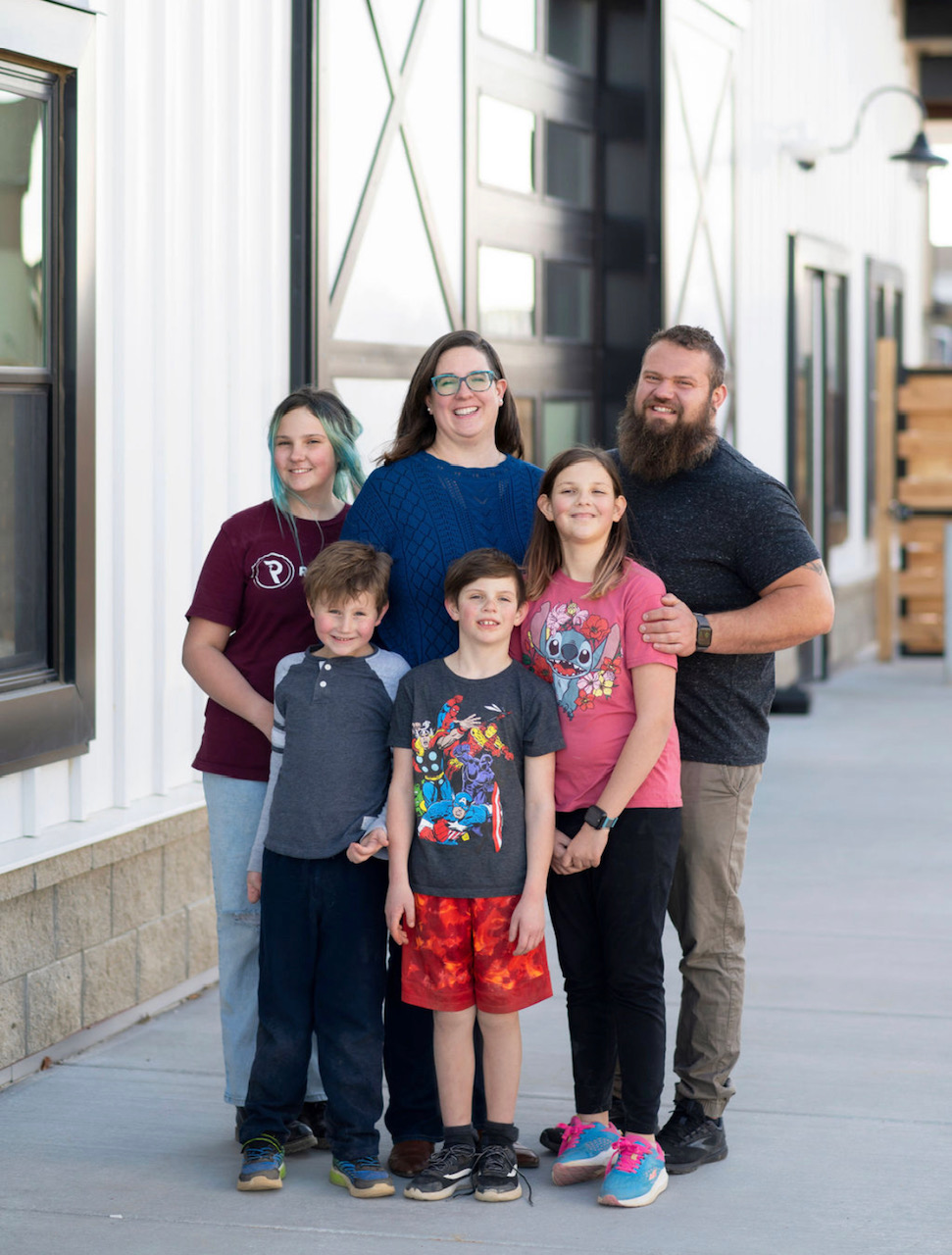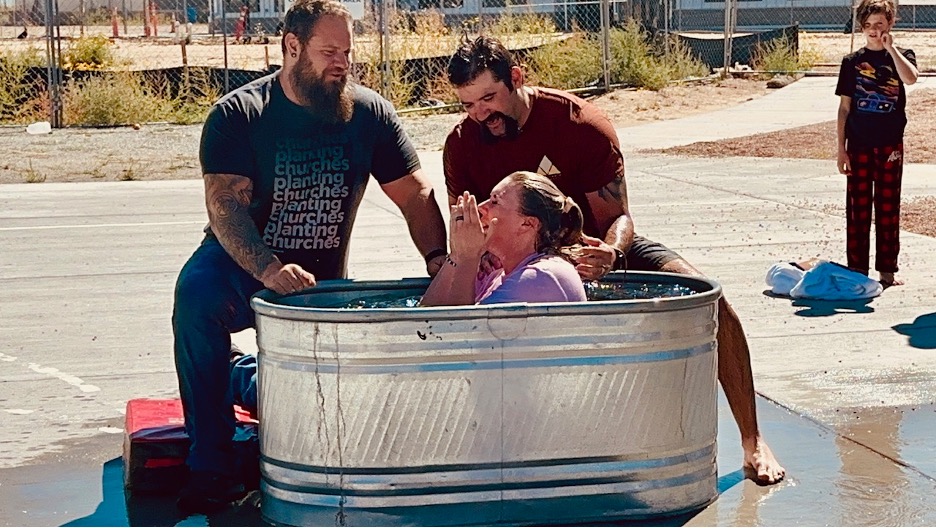In a city where church skepticism runs deep and transience is the norm, Andrew and Hannah Morrison discovered that to plant a church that thrives, they’d have to do it differently.
The Colorado natives planted Reunion Church four years ago in Commerce City after seeing the enormous population growth and lack of Christian presence. And even though others had tried to plant a church in the area before without success, Reunion Church remains in the community, largely due to the church’s covocational culture.
As a covocational church planter, Andrew intentionally maintains a full-time job in sales, competes as a strongman athlete, and shepherds a growing community of believers. His life is a blend of work, family, ministry, and mission—and it’s this very integration that gives him unique credibility in his city.
“People around here can spot inauthenticity a mile away,” Andrew shares. “Being covocational actually works in my favor. They see I’m not doing this for a paycheck. I’m doing it because I am passionate about Jesus and truly believe He transforms lives.”
Engaging the City Through Presence and Posture
Andrew didn’t start with a building or a band. He started with a coffee shop.
A popular café became his first hub of presence in the city. He worked there and spent time getting to know the people. From a posture of presence—just being available—he developed relationships that turned into spiritual conversations, and eventually, a core team.
When he looked across the street and saw a school, rather than trying to leverage the school for space or influence, he approached them with a simple question: How can we help? How can we serve you?
That humble posture unlocked an incredible partnership. From volunteering, to hosting a fundraiser through a strongman competition, they supported the school in creative, practical ways. Eventually, the school offered their space for the church to gather on Sundays—and even invited Andrew to serve on the school board.
“We didn’t come to take anything,” Andrew says. “We came to give. That’s what the kingdom looks like.”
A Church Where Everyone Plays a Part
 The covocational strategy also shapes the culture of the church. With no full-time staff and limited time, the burden of ministry doesn’t fall on one person, or even a select few. It requires the whole church to function together.
The covocational strategy also shapes the culture of the church. With no full-time staff and limited time, the burden of ministry doesn’t fall on one person, or even a select few. It requires the whole church to function together.
People are taking ownership of what God is doing because they believe in the mission. Hospitality, kids ministry, teaching, discipleship—all of it is owned by everyday people who’ve caught the vision of being the church together.
“One of the unexpected gifts of being covocational,” Andrew says, “is that you’re forced to develop others. It’s not just a preference; it’s survival. And that’s exactly how the church should function: everyone using their gifts for the maturity of the body.”
Andrew’s intentional focus on discipleship is already bearing fruit. Three men in the church are currently being developed as future church planters, each beginning to dream about how they might multiply disciple-making communities in different parts of the city.
“It’s not about launching quick,” Andrew says. “It’s about forming leaders who love Jesus, love people, and are ready to lead well when the time comes.”
Slow Work, Deep Roots
From the outset, Andrew and Hannah prioritized intentional discipleship. Rather than rushing to grow numerically, they invested in relationships – walking with people through the long process of becoming more like Jesus. That means progress often feels slow and incremental, but it is often longer lasting.
“Discipleship is the mission,” Andrew says. “We’re not trying to build a crowd. We’re trying to grow people who look like Jesus.”
Sundays reflect that priority. Their weekly gathering includes worship and teaching, but a vital part of the gathering is spent in what they call Table Talks. Around tables, groups discuss what they’ve heard, diving into early-level discipleship conversations. Table leaders guide them through questions focused on applying Scripture to real life—how to forgive, how to serve, how to live on mission where they are.
The format is simple but powerful. It breaks down the wall between hearing the Word and living it out, and it creates a space where even new believers or spiritually curious people feel invited to wrestle with faith in community.
“It’s not a lecture hall; it’s a family gathering,” Andrew explains. “We want people to engage with God and each other. It’s a launching pad for people into deeper levels of discipleship.”
Strongman and Shepherd
Andrew’s unique presence as both a strongman competitor and a pastor gives him access to spaces many church planters never reach. He’s built friendships in the gym and fitness world, using those connections to share the gospel, disciple others, and represent Jesus in unexpected places.
“It’s like I get instant street cred,” Andrew laughs. “They know I’m not here to use them to build a brand. I’m a neighbor, a coworker, a friend who just happens to also be planting a church.”
Hannah, too, is deeply rooted in the community—whether through mentoring women, hosting in their home, or cultivating relationships with neighbors and school staff.
“We love the neighborhood we live in,” Hannah says. “We knew that to effectively plant in this community, we were going to have to live in the heart of the city. And God, in His kindness, miraculously made a way for us to do that.”
Church members are also following their lead. Many are now seeing their own spheres—jobs, hobbies, schools, neighborhoods—as mission fields. So today, in a city that still scrutinizes institutions, there’s now a community of faithful Jesus followers reaching their neighbors. God is working through Reunion Church not only on Sundays, but every day in between.
To explore resources, get coaching, and find opportunities to partner in what God is doing across North America through covocational church planting, visit SendNetwork/Covocational-Church-Planting.
Published June 2, 2025
